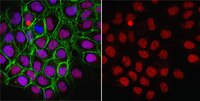ABE1440 Sigma-AldrichAnti-Thymine-DNA Glycosylase Antibody
Anti-Thymine-DNA Glycosylase Antibody is an antibody against Thymine-DNA Glycosylase for use in Western Blotting, Immunocytochemistry.
More>> Anti-Thymine-DNA Glycosylase Antibody is an antibody against Thymine-DNA Glycosylase for use in Western Blotting, Immunocytochemistry. Less<<お勧めの製品
概要
| Replacement Information |
|---|
主要スペック表
| Species Reactivity | Key Applications | Host | Format | Antibody Type |
|---|---|---|---|---|
| H, M | WB, ICC | Rb | Affinity Purified | Polyclonal Antibody |
| References |
|---|
| Product Information | |
|---|---|
| Format | Affinity Purified |
| Presentation | Purified rabbit polyclonal antibody in buffer containing 0.1 M Tris-Glycine (pH 7.4), 150 mM NaCl with 0.05% sodium azide. |
| Quality Level | MQ100 |
| Physicochemical Information |
|---|
| Dimensions |
|---|
| Materials Information |
|---|
| Toxicological Information |
|---|
| Safety Information according to GHS |
|---|
| Safety Information |
|---|
| Storage and Shipping Information | |
|---|---|
| Storage Conditions | Stable for 1 year at 2-8°C from date of receipt. |
| Packaging Information | |
|---|---|
| Material Size | 100 µL |
| Transport Information |
|---|
| Supplemental Information |
|---|
| Specifications |
|---|
| Global Trade Item Number | |
|---|---|
| カタログ番号 | GTIN |
| ABE1440 | 04055977329551 |
Documentation
Anti-Thymine-DNA Glycosylase Antibody (M)SDS
| タイトル |
|---|
Anti-Thymine-DNA Glycosylase Antibody 試験成績書(CoA)
| タイトル | ロット番号 |
|---|---|
| Anti-Thymine-DNA Glycosylase - 3890565 | 3890565 |
| Anti-Thymine-DNA Glycosylase -Q2650999 | Q2650999 |
| Anti-Thymine-DNA Glycosylase Polyclonal Antibody | 3059059 |











